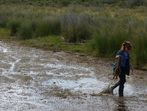|
By Julie F. Charbonnier
Receiving and giving feedback is the heart of any educational experience, whether it be formal education or work training. As an undergraduate, you’ll receive feedback primarily through grades on assignments and exams. In graduate school and beyond, you’ll receive feedback on your ideas, communication skills, and scientific knowledge during key stages like your proposal defense and qualifying exams. Feedback from other scientists is what can take your ideas to the next level and ultimately make you a better scientist. We are the sum of our closest mentors and peers that challenge us and force us to grow, and this growth comes from compassionate but tough criticism. Despite feedback being a critical component of any scientific graduate experience, no one receives training on how to give and receive feedback so that it can be effective and constructive. Instead, there is an unwritten rule in academia that whoever receives feedback should have “thick skin” and just take whatever feedback comes his/her way. However, this kind of approach essentially removes any responsibility from the feedback giver. Feedback is a joint communication, an exchange, where both receiver and giver have responsibilities to uphold. Giving feedback is not a free pass to be cruel or critical - it’s an opportunity to contribute to another person’s development by challenging and encouraging them with focused and detailed questions. Likewise, the person that receives feedback should contribute by asking follow up questions, asking for clarification, and actively listening. With this in mind, here are some tips to both giving and receiving feedback on your work. How to ask for and receive good feedback
When giving feedback, the rules are the same but reversed. Keep in mind many people are uncomfortable receiving critical feedback on their ideas, particularly if they have been working on something for a long time. Additionally, keep in mind that especially in meetings, you may have additional challenges if you are a woman.

About the Author
Julie F. Charbonnier is a 5th year PhD candidate in Integrative Life Sciences at Virginia Commonwealth University. Her research focuses on amphibian and population ecology. She is also interested in scientific writing and science policy. You can follow Julie on Twitter @modernecologist. Comments? Leave them below!
1 Comment
|
The Scientista Foundation, Inc. All Rights Reserved © 2011-2021 | Based in NY | [email protected]
The Network for Pre-Professional Women in Science and Engineering
The Scientista Foundation is a registered 501(c)(3) -- Donate!
The Network for Pre-Professional Women in Science and Engineering
The Scientista Foundation is a registered 501(c)(3) -- Donate!
